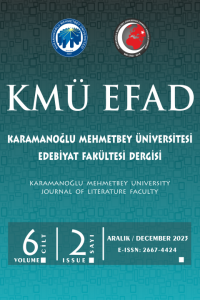Öz
This study deals with Aristotle’s ideas on society in the context of his ethical and political philosophy focusing on the question of whether society emerges out of necessity or chance. Since his social philosophy is part of his ideas on society, morality, and politics, to respond to this question it analyzes his ideas on society as interconnected to his moral and political views. Moreover, it explains his ideas on life, soul, and mind exhibiting Aristotle’s perspective on these ideas in his philosophical system. Therefore, the study examines these ideas about his general philosophy concerning discussions about mind, life, human, and politics. Accordingly, it posits that society is the outcome of collective good and happiness, which is achieved through ethical behaviour. This habituation is the very product of politics that occurs through moral behavior whose telos is a just life amongst fellow humans. In this sense, it claims that Aristotle puts forward that society is not the product of either necessity or chance since human actions are neither automatic results of natural laws nor uncontrollable external forces.
Anahtar Kelimeler
Chance Aristotle’s Ethics Aristotle’s Theory of Society Necessity
Kaynakça
- Aristotle. (1985). Aristotle’s De Motu Animalium. (M.C. Nusbaum, Trans.). Princeton: Princeton University Press.
- Aristotle. (1994). Aristotle Metaphysics, (D. Bostock, Trans.). Oxford: Clanderon Press; New York: Oxford University Press.
- Aristotle. (1998). The Politics. (C.E.E. Reeve, Trans.), Indianapolis: Hackett Publishing.
- Aristotle. (2001). On Generation and Corruption. R. McKeon (Ed.). In Basic Works of Aristotle (pp. 559-636), (H. H. Joachim, Trans.). New York: The Modern Library.
- Aristotle. (2008). Physics, (R. Waterfield, Trans.). Oxford; New York: Oxford University Press.
- Aristotle. (2009). The Nicomachean Ethics, (L. Brown & D. Ross, Trans.). London: Oxford University Press.
- Aristotle. (2011). The Eudemian Ethics, (A. Kenny, Trans.), London: Oxford University Press.
- Aristotle. (2016). De Anima, (C. Shields, Trans.). London: Oxford University Press.
- Conacher, D. (1998). Euripides and The Sophists. London, Gerald Duckworth.Guthrie, W.K.C. (1971). London: Cambridge University Press.
- Kerferd, G.B. (1981). The Sophistic Movement. Cambridge, Cambridge Universit Press.
- Kirk, G. S., Raven, K. (1963). Presocratic Philosophers. Cambridge, Cambridge University Press.
- Plato. (1987). The Theaetetus. (A.H. Waterfield). New York: Viking Penguin.
- Plato. (1993). The Sophist. (N.P. White, Trans.), Indianapolis: Hackett Publishing.
- Plato. (1994). Republic. (R. Waterfield, Trans.). London: Oxford University Press.
- Plato. (1998). Symposium. (R. Waterfield, Trans.). London: Oxford University Press.
- Plato. (2017). Apology. In Euthyphro, Apology, Crito, Phaedo, (pp. 61-145), (H. N. Fowler), Cambridge: Harvard University Press.
- Ross, D. (2005). Aristotle. London: Routledge.
Öz
Bu çalışma, Aristoteles’in etik ve politik felsefesi dâhilindeki toplum üzerine düşüncelerini, toplumun zorunlulukla mı yoksa şansla mı ortaya çıkar sorusuna verdiği cevaba odaklanarak ele alır. Onun sosyal felsefesi toplum, ahlak ve politika ile ilgili fikirlerinin bir parçası olduğundan bu soruyu cevaplamak için toplum üzerine görüşlerini ahlaki ve politik görüşleri ile bağlantılı olarak analiz eder. Ayrıca Aristoteles bu düşüncelerini genel felsefe sistemine nasıl yerleştirdiğini ortaya koyarak zihin, yaşam, ruh, insan ve politika ile ilgili düşüncelerini açıklar. Bu nedenle bu fikirleri onun zihin, yaşam, insan ve politika hakkındaki tartışmaları ile ilgili genel felsefesiyle ilişkili olarak inceler. Böylelikle toplum, bireylerin etik bir biçimde davranmaya dönük alışkanlığının inşa edilmesiyle oluşan ortak iyinin ve mutluluğun üretimi ve cisim bulmuş hâli olarak meydana gelir. Bu alışkanlık, telosu insanlar arasında adil bir yaşam kurmak olan ahlaki davranış aracılığıyla oluşan politikanın ürünüdür. Gösterildiği üzere Aristoteles’e göre insan eylemleri ne doğa ve evrenin zorunluluklarının otomatik bir etkisiyle oluşur ne de faillerin kontrolü dışındaki güçler ve şartların neden olduğu olumsallıkların ve şansların ürünüdür. Bu bağlamda çalışmanın temel iddiası, Aristoteles’in düşüncesinde toplumun ne zorunluluk ne de şansla meydana geldiğini ileri sürdüğü yönündedir.
Anahtar Kelimeler
Aristoteles’in Etiği Aristoteles’in Toplum Kuramı Zorunluluk Şans.
Kaynakça
- Aristotle. (1985). Aristotle’s De Motu Animalium. (M.C. Nusbaum, Trans.). Princeton: Princeton University Press.
- Aristotle. (1994). Aristotle Metaphysics, (D. Bostock, Trans.). Oxford: Clanderon Press; New York: Oxford University Press.
- Aristotle. (1998). The Politics. (C.E.E. Reeve, Trans.), Indianapolis: Hackett Publishing.
- Aristotle. (2001). On Generation and Corruption. R. McKeon (Ed.). In Basic Works of Aristotle (pp. 559-636), (H. H. Joachim, Trans.). New York: The Modern Library.
- Aristotle. (2008). Physics, (R. Waterfield, Trans.). Oxford; New York: Oxford University Press.
- Aristotle. (2009). The Nicomachean Ethics, (L. Brown & D. Ross, Trans.). London: Oxford University Press.
- Aristotle. (2011). The Eudemian Ethics, (A. Kenny, Trans.), London: Oxford University Press.
- Aristotle. (2016). De Anima, (C. Shields, Trans.). London: Oxford University Press.
- Conacher, D. (1998). Euripides and The Sophists. London, Gerald Duckworth.Guthrie, W.K.C. (1971). London: Cambridge University Press.
- Kerferd, G.B. (1981). The Sophistic Movement. Cambridge, Cambridge Universit Press.
- Kirk, G. S., Raven, K. (1963). Presocratic Philosophers. Cambridge, Cambridge University Press.
- Plato. (1987). The Theaetetus. (A.H. Waterfield). New York: Viking Penguin.
- Plato. (1993). The Sophist. (N.P. White, Trans.), Indianapolis: Hackett Publishing.
- Plato. (1994). Republic. (R. Waterfield, Trans.). London: Oxford University Press.
- Plato. (1998). Symposium. (R. Waterfield, Trans.). London: Oxford University Press.
- Plato. (2017). Apology. In Euthyphro, Apology, Crito, Phaedo, (pp. 61-145), (H. N. Fowler), Cambridge: Harvard University Press.
- Ross, D. (2005). Aristotle. London: Routledge.
Ayrıntılar
| Birincil Dil | İngilizce |
|---|---|
| Konular | Etik, Sosyal Teori |
| Bölüm | İnceleme Makalesi |
| Yazarlar | |
| Yayımlanma Tarihi | 30 Aralık 2023 |
| Gönderilme Tarihi | 28 Eylül 2023 |
| Kabul Tarihi | 15 Aralık 2023 |
| Yayımlandığı Sayı | Yıl 2023 Cilt: 6 Sayı: 2 |
Kaynak Göster
Cited By
Demokratik Vatandaşlık ile Siyasal Katılımın Kuşaklar Çerçevesinde İncelenmesi: Bir Alan Araştırması
International Journal of Management Economics and Business
https://doi.org/10.17130/ijmeb.1541302
Karamanoğlu Mehmetbey Üniversitesi Edebiyat Fakültesi Dergisi Creative Commons Atıf-GayriTicari-Türetilemez 4.0 Uluslararası Lisansı ile lisanslanmıştır.
Karamanoglu Mehmetbey University Journal of the Faculty of Letters is lisensed under a Creative Commons Attribution-NonCommercial-No Derivative 4.0 International License.


